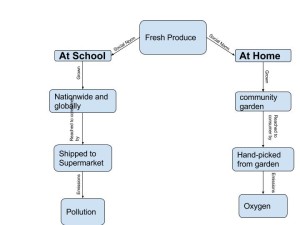- At home, I teach at a childcare center located inside of a church. The church runs an organic garden that is free for the public and church members to use. I am influenced greatly by social norms when I work there because I have access to free, fresh, and locally grown fruits and vegetables. By having this access at my job, I do not have to go out of my way to get produce, nor do I have to purchase produce that has been shipped across the country. When I am at school, I do not have the luxury of walking out the door, picking out what fruits and veggies I want, quickly cleaning them, and then eating them. At school the social norm is similar to most other places, which is to drive to the grocery store and purchase produce that typically has been shipped by trucks, planes, ships, and/or buses.
- This social norm of how I eat at school compared to work at home is connected to healthy food choice. When I am working at home, I have access to locally grown pesticide free produce. At school I do not have this option, therefore, I purchase produce from a Supermarket. By purchasing produce from a big-name Supermarket, I am no longer eating local grown produce, but instead produce that has been shipped from all over the country and even the world. By purchasing produce that requires transportation and shipments, I am indirectly contributing to the emission of greenhouse gases into the environment. At home I do not usually leave a carbon footprint that releases pollution into the atmosphere and that is the social norm for my work community. At school, the social norm is to purchase produce that has been shipped and therefore leads to the emission of pollution into the environment.

3 thoughts on “Produce Social Norm- Katie Greiner”
Leave a Reply
You must be logged in to post a comment.

Hello Katie! My name is Jonah. Here is a link to my blog.
http://geog030.dutton.psu.edu/2016/03/04/module-6-jonah-kim/
I was drawn into your blog as I was reading about the differences in locally grown versus supermarket shipped and bought food, while I focused more on nutrition in my social norm. It sounds like you have the opposite problem of me and are not tempted by eating fast food. It is also very enlightening to hear that you are cautious of buying from supermarkets because of the carbon footprint there trucks shipping food across the country. I too will start thinking about this so I appreciate it.
Hi Katie! My name is Amir, here is my blog post if you’re interested!
http://geog030.dutton.psu.edu/2016/03/04/a-bite-into-islam/
Our family owns a farm in Jordan, and I agree with you, there’s no bigger delight than picking the fruits and veggies you’re going to eat. As opposed to getting it at the store. Your post hit caught my attention because I haven’t gone back in years and it hit home. I also like your view on how a supermarket purchase indirectly affects the environment. I think most people fail to look at the trail their purchases leave behind, and it’s often a matter of environmental justice. It sucks, but it’s what we get stuck with here at school.
Greetings Katie! My name is Kevin I like how you also approached the difference in locally grown versus supermarket shipped and bought, my area is very big on locally grown food, but it comes at a cost. Our locally grown vegetables, fruit, beer, wine, olives, and nuts have created a sort of tourism business to the area and we are coupled with an emphasis on red meat, which is promoting more and more Methane! I have been very separated from the schools for a while being a single male with no children doing online school so I did not even consider the idea of where the school foods come from or any considerations schools work with to feed students.
come read my post! http://geog030.dutton.psu.edu/2016/03/04/californias-central-coast-bbq/